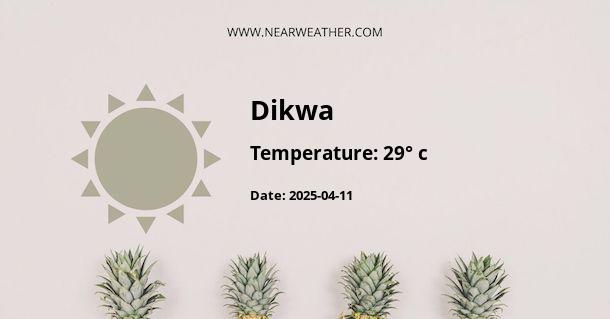Climate and Weather in Dikwa, Nigeria
Dikwa is a town located in the northeastern part of Nigeria, specifically in the Borno State. It is situated in the Sahel region, which is characterized by a semi-arid climate. The climate in Dikwa is influenced by its proximity to the Sahara Desert, resulting in hot and dry conditions throughout most of the year.
Temperature
The average annual temperature in Dikwa is around 30 degrees Celsius (86 degrees Fahrenheit). The hottest months are typically March to May, with temperatures often exceeding 40 degrees Celsius (104 degrees Fahrenheit). These months are characterized by scorching heat and very little rainfall.
During the cooler months of November to February, temperatures range between 20 to 25 degrees Celsius (68 to 77 degrees Fahrenheit) during the day and can drop to around 10 degrees Celsius (50 degrees Fahrenheit) at night. These months are considered the most comfortable in terms of temperature, although they can still be relatively warm compared to other regions.
Rainfall
Dikwa experiences a distinct wet and dry season. The wet season typically lasts from June to September, with July and August being the rainiest months. During this period, Dikwa receives an average of 150 to 200 millimeters (5.9 to 7.9 inches) of rainfall per month. The rain showers are often intense and can lead to localized flooding.
The dry season, on the other hand, spans from October to May. Precipitation during this period is scarce, with only occasional light showers. The months of December to February are particularly dry, with almost no rainfall. This prolonged dry spell contributes to the arid conditions in the region.
Wind Patterns
Dikwa experiences the Harmattan wind, which blows from the Sahara Desert during the dry season. The Harmattan wind brings with it a significant amount of dust and sand, reducing visibility and creating hazy conditions. It also contributes to the dryness and high evaporation rates in the region.
Climate Challenges
The climate in Dikwa poses several challenges for the local community. The combination of high temperatures and scarce rainfall makes agriculture and water availability difficult. Farmers often rely on irrigation systems to cultivate crops, and water scarcity can become a major issue during the dry season.
The arid conditions and frequent dust storms also have implications for public health. Dust particles in the air can exacerbate respiratory conditions and cause discomfort for residents. Additionally, the dry conditions increase the risk of wildfires, which can be destructive to both natural vegetation and human settlements.
Climate Change
Like many other regions around the world, Dikwa is not immune to the effects of climate change. Rising global temperatures and changing weather patterns can have significant impacts on the already fragile climate in this region. These changes may further exacerbate the challenges faced by the local community, including water scarcity and agricultural productivity.
It is essential for policymakers and stakeholders to prioritize climate change adaptation and mitigation strategies in Dikwa and other vulnerable areas. This may include implementing sustainable agricultural practices, improving water management systems, and raising awareness about the importance of climate resilience.
Conclusion
Dikwa, Nigeria, experiences a hot and dry climate throughout most of the year, with a distinct wet and dry season. The average temperature is around 30 degrees Celsius (86 degrees Fahrenheit), with the hottest months being March to May. The town receives most of its rainfall between June and September, while the dry season lasts from October to May. The region faces challenges related to water scarcity, agricultural productivity, and public health due to the arid conditions. Climate change further exacerbates these challenges, emphasizing the need for climate resilience and adaptation strategies in Dikwa.
A - Dikwa's Latitude is 12.023960 & Longitude is 13.916460.
A - Weather in Dikwa is 35° today.
A - Climate Conditions in Dikwa shows scattered clouds today.
A - Humidity in Dikwa is 13% today.
A - Wind speed in Dikwa is 27.36 km/h, flowing at 8° wind direction. today.
